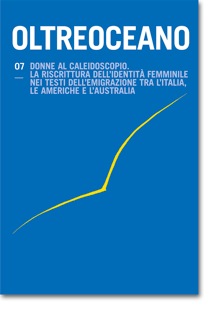Entre catábasis e iniciación: la experiencia migratoria femenina en La crisálida de Nisa Forti
Keywords:
catábasis, iniciación, experiencia migratoria femeninaAbstract
El presente trabajo se ocupa de la novela autobiográfica La crisálida (1984) de la escritora italiana Nisa Forti (1934-2009) emigrada a Argentina en 1948. A partir del desarraigo que la protagonista adolescente sufre, se estudia el universo simbólico que la escritura construye alrededor de la representación de la experiencia migratoria como repetición del esquema mitológico de catábasis y anábasis. El paso sucesivo viene a ser el análisis del valor iniciático que dicho proceso adquiere dentro de la conformación del discurso migratorio.
Catabasis and Initation: Women’s Migratory Experience in Nisa Forti’s La Crisálida
The subject of the present study concerns the autobiographical novel La Crisalida by Italian writer Nisa Forti (1934-12009), emigrated in Argentina in 1948. Stemmimg from the uprootedness suffered by the adolescent main character, the study id directed towards the symbolic universe built around the representation of the migratory experience, seen as a rehearsal of the mythological scheme of catabasis and anabasis. The study then proceedes to an analysis of the initiation significance within migratory discourse.
Catabasi e inziazione: l’esperienza migratoria femminile in La crisálida di Nisa FortiIl presente lavoro si occupa del romanzo autobiografico La crisalide (1984) della scrittrice italiana Nisa Forti (1934-2009) emigrata in Argentina nel 1948. A partire dallo sradicamento sofferto dalla protagonista adolescente, viene studiato l’universo simbolico che la scrittura costruisce intorno alla rappresentazione dell’esperienza migratoria come ripetizione dello schema mitologico di catabasi e anabasi. Il passo successivo è l’analisi del valore iniziatico che detto processo acquisisce all’interno della conformazione del discorso migratorio.
Downloads
References
Aub, M. (1995): La gallina ciega. Diario español. Barcelona: Alba.
Cacciavillani, G. (Ed), (2003): Spazi di memoria. Venezia: Cafoscarina.
Campbell, J. (1959): El héroe de las mil caras. México: Fondo de cultura Económica.
Clark, K. (1981): The Soviet Novel. History as Ritual. Chicago and London: The University of Chicago Press.
De Martino, E. (1973): Il mondo magico. Torino: Bollati Boringhieri.
Eliade, M. (1967): Lo sagrado y lo profano. Madrid: Guardarrama.
Eliade, M. (1999): Nacimiento y renacimiento: significado de la iniciación en la cultura humana. Barcelona: Kairos.
Ejchenbaum, B. (1968): Teoria della prosa. In T. Todorov (Ed.), I formalisti russi. Teoria della letteratura e metodo critico (pp. 231-247). Torino: Einaudi.
Forti, N. (1965): Diálogos con mis niños. Buenos Aires: Instituto Amigos del Libro Argentino.
Forti, N. (1967): Juventud sin Dioses. Buenos Aires: Falbo.
Forti, N. (1984): La crisálida. Buenos Aires: Corregidor.
Forti, N. (1990): El Tiempo, el Amor, la Muerte. Buenos Aires: Gente de Letras.
Forti, N. (2005): Tu atroz no estar. Buenos Aires: Ayala Palacios.
Klein, M. (2006): Scritti. 1921-1958. Torino: Bollati Boringhieri.
La Cecla, F. (1988): Perdersi. L’uomo senza ambiente. Roma-Bari: Laterza.
Sklovski, V. (1968): La struttura della novella e del romanzo. In T. Todorov (Ed.), I formalisti russi. Teoria della letteratura e metodo critico (pp. 207-229). Torino: Einaudi.
Sozzi, L. (2011): Gli spazi dell’anima. Torino: Bollati Borighieri.
Ugarte, M. (1999): Literatura española en el exilio. Un estudio comparativo. Madrid: Siglo XXI.
Van Gennep, A. (2008): Los ritos de paso. Madrid: Alianza.
Downloads
Published
How to Cite
Issue
Section
License

This work is licensed under a Creative Commons Attribution-NonCommercial-ShareAlike 4.0 International License.
The authors undertake to comply with the following conditions, which are considered accepted at the time of submission of their contributions.
The sending of a text implies that it is unpublished and not submitted to be published elsewhere.
1. If accepted, the author shall confer on the publisher the right to publish and distribute it both in paper form and in the online electronic edition. The published articles will be downloadable and made available in open access.
2. Provided that it correctly indicates that the first publication took place in the journal Oltreoceano. Rivista sulle migrazioni the author has the right to: a) reproduce the article in separate extracts or collected in a volume; b) publish the article on their personal website or teaching site provided that these sites are of a non-commercial nature; c) deposit the article in online archives of a non-commercial nature, linked to the institution they belong to or as part of projects for the non-commercial dissemination and open access of scientific works.
The use of contributions by third parties, for commercial or otherwise unauthorized purposes, is not allowed. The publisher declines all responsibility for the unauthorized use of the material published in the journal.












